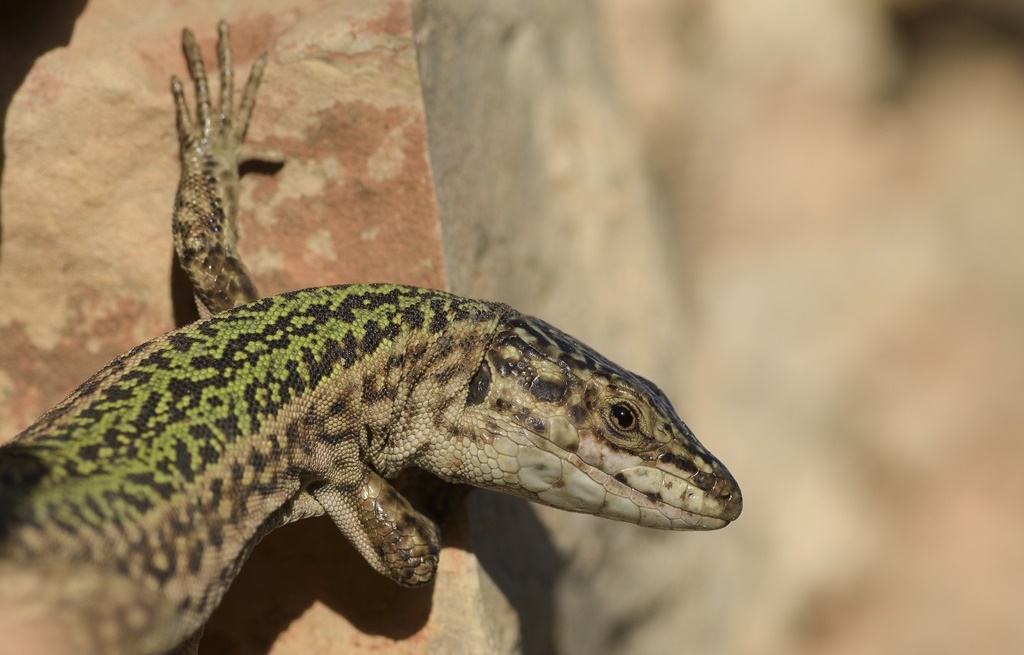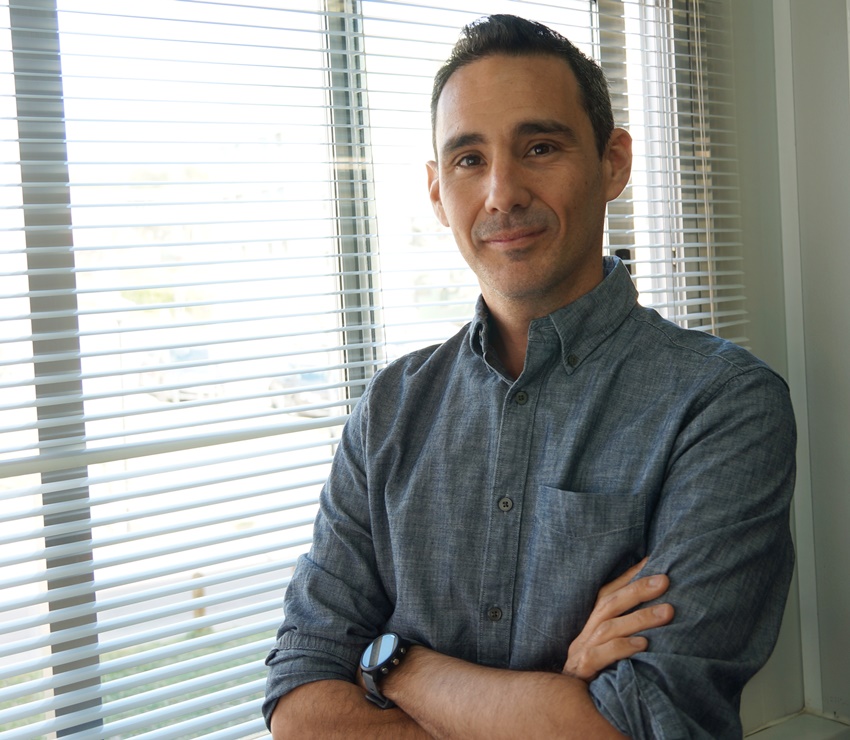Oriol Lapiedra, a nature enthusiast whose hard work lures in new opportunities
Opportunity is one of the words that constantly pepper the discourse of CREAF researcher Oriol Lapiedra: when he talks about to study an endangered bird in Lleida (working for the Department of Animal Physiology at the University of Barcelona), when he recalls his doctorate at CREAF with researcher Daniel Sol Rueda and when he explains how he then began a 5-year period at Harvard University, having made contact at a conference with evolutionary biologists Jonathan Losos and Jason J Kolbe. He continues to speak of opportunity when he explains his return to Europe and to CREAF as a post-doctoral researcher, to set up his own laboratory, and also when he details his appointment twice as a National Geographic Explorer following his research on Anolis lizards. He even speaks of opportunity when he recalls his family holidays in the Pyrenees when he was a child, holidays which he used to continue birdwatching. And listening to him, one wonders whether he is a nature enthusiast whose hard work lures in new opportunities.
Plants, minerals and dinosaurs were part of his childhood fascination with nature, until birds took centre stage. "Birds became a refuge, they were always in my head and they were my world" he recalls "Traveling by car I always made a mental list of their sound. I was always listening to them: if I wasn't interested in conversations or when doing some mechanical task". The influence of grandparents who owned a bird shop seems like a good start to the tale of a child captivated by birds, who kept their sounds in his memory. But the fable has a dose of fantasy, because Lapiedra himself acknowledges that devoting his doctoral thesis to researching bird behaviour is not the result of a family legacy.
"Short-termism and lack of stability are so common in science today, that we too often think more about productivity than about doing relevant science, which means answering relevant questions"
"My doctorate revolved around the role of animal behaviour in evolution. We identified evolutionary patterns in more than 300 species of pigeons, a subject that captivated me, but a crucial answer was missing: Can differences in behaviour imply natural selection? In another way: does natural selection act on behaviour? For example, in long periods of drought, Galapagos finches develop bigger and stronger beaks to break up hardened seeds. In the lab where he did his thesis, he focused on answering questions and challenges in a stage of deep learning: "I learned things I would never have thought I would deal with, such as phylogenetic methods, working with data... and I worked hard".
When an article changes one's life
Fieldwork was the spark that connected him with research, and then reading scientific articles and trying to identify problems. Reading an article on Anolis lizards changed his life in depth in 2012: not only did it mark the beginning of his scientific work with saurians, leaving birds aside, but it opened the door to 5 years of collaboration with two of its authors - researchers Jonathan Losos and Jason J Kolbe - at Harvard University. "I contacted them, met them at a conference in the United States and they were kind enough to answer me and meet me", he explains. "It was a very well thought-out and not at all impulsive decision, and it became one of those situations in which receiving a reply from an email changed my life.
"I consider myself a naturalist, that is, things have worked out well for me when I have observed nature and asked myself why certain patterns are occurring"
The recently graduated Oriol Lapiedra still had to answer the question of whether natural selection acts on behaviour. But it was necessary to change animals: with birds it was impossible and he didn't want to work with fish. Losos and Kolbe used small islands in the Bahamas as petri dishes, where they introduced populations of anole lizards to observe their behaviour under different conditions. Lapiedra's fascination was such that the syncopated movements of cold-blooded lizards have been the focus of his scientific life ever since.

"There is a lot of talk about animal personality, I prefer to talk about individual variation in behaviour: the first challenge is how we find behaviours in the wild that are guaranteed to be ecologically relevant, and the second is how we evaluate behaviour. And he notes what seems like a statement of intent and a self-definition: "I consider myself a naturalist, that is, things have worked for me when I have observed nature and asked myself why certain patterns are occurring".
Research in the US
He worked for almost 5 years at Harvard University, funded by a PhD thesis award, fellowships (such as his first National Geographic Explorer) and employment contracts that gave him enough stability. "I arrived to Jonathan Losos' lab with a lot of drive and, although I funded the first six months with an award, I was soon provided with stability". The collaboration culminated in the publication in the journal Science of the article Predator-driven natural selection on risk-taking behavior in anole lizards.
"The work carried out and the results obtained closed a scientific cycle, a before and after in the scientific career", he says matter-of-factly. "In fact, the day the paper was published, my first daughter was born. And returning to Europe was a decision linked to the conviction that I had already demonstrated what was necessary: to start research from scratch, unlinked to my thesis, with all the personal involvement that it meant for having few resources...". A grant enabled the family to return to Europe, as one of the priorities was also the professional relocation of their partner, a senior research scientist who won a position in Catalonia. Although Lausanne, in Switzerland, was an option, Oriol Lapiedra finally decided to return to CREAF: "is establishing itself as a leading European research centre in ecology. It has very good researchers in global change, biological invasions and urbanisation, aspects that interest me a lot", he argues.
Thinking big
The main lesson Lapiedra takes from the United States is to change the way of thinking, to be able to approach projects with scope and without initial limitations. And, in addition, a solid and persistent reinforcement of the necessary diversity of the people who make up research groups, above all in terms of gender, but also in terms of age, nationality and skills."One of the most important things I learned in the United States is a change of mindset to learn to think big. First think ambitiously about the questions to be answered and then take into account the limitations... but never the other way round". And, thanks to the fact that he openly mentions the precariousness of the scientific system, he goes on to say that "short-termism and lack of stability are so common in science today, that we too often think more about productivity than about doing relevant science, which means answering relevant questions".

"If a research group is all white male, as traditional research has been... this is not innovation, is repeating the same"
In his speech, the need to diversify teams is almost a mantra, and when I ask him what he is referring to, he answers straight ahead: first of all, gender. And then he defends a heterogeneous professional experience, different training, age, nationality. "I study individual variation in behaviour and I find that the diversity of profiles benefits populations, because of their different ways of coping with predators. It's diversity that allows them to get ahead". He pays special attention to internationalisation, which is why his team now includes people from Poland, the United States and Greece, among others. "Different cultures in the laboratory bring together complementary ways of approaching problems and identifying solutions, it is crystal clear to me", he says, while regretting that in Europe the second generations of immigrant families have not yet arrived at the university and research. "If a research group is all white male, as it has been in traditional research... this is not innovation, it repeating the same".
"Different cultures in the laboratory bring together complementary ways of approaching problems and identifying solutions, it is crystal clear to me"
The unfortunate examples of the difference in opportunities between scientists and women scientists, the daily micro-aggressions and the necessary resilience on the part of women in science are also part of a reality that worries him he has observed it both in the United States and in Europe.
"Research should be used to answer questions, not to publish"
In parallel to the concern about gender, there is a thought about how science works: "Unfortunately, the scientific system forces us to publish a lot, especially young researchers, and this is neither good nor bad, but it doesn't help when it makes us lose focus and takes time away from asking big questions. And research should be used to answer questions, not to publish". And thanks to the references who have accompanied him. The opportunities, once again. "I have been fortunate to have referent people close to me who have helped me to orient myself, to answer questions rather than to publish articles".







